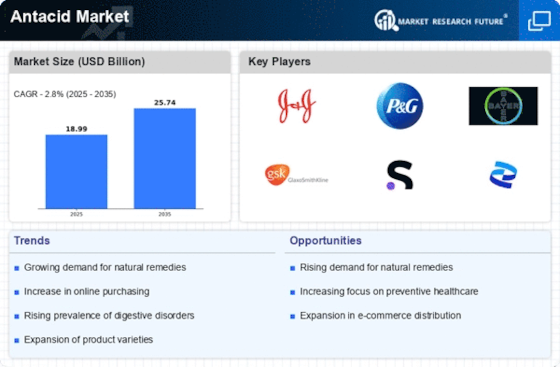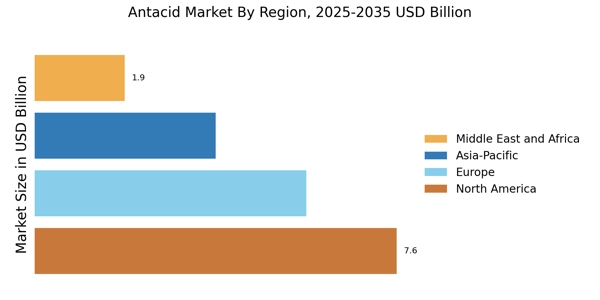Innovation in Product Formulations
Innovation in product formulations is a pivotal driver for the Antacid Market. Manufacturers are increasingly focusing on developing advanced formulations that offer enhanced efficacy and faster relief from symptoms. This includes the introduction of antacids with dual-action properties, combining acid neutralization with additional digestive benefits. Furthermore, the trend towards natural and organic ingredients is gaining traction, as consumers seek alternatives to traditional antacids. Research indicates that products containing herbal extracts and probiotics are becoming more popular, reflecting a shift towards holistic health solutions. This innovation not only caters to consumer preferences but also positions companies competitively within the Antacid Market. As new products enter the market, they are likely to attract a broader consumer base, thereby driving overall market growth.
Rising Awareness of Digestive Health
There is a growing awareness of digestive health among consumers, which serves as a significant driver for the Antacid Market. Educational campaigns and health initiatives have increased public knowledge regarding the importance of maintaining digestive wellness. As individuals become more informed about the consequences of untreated acid-related disorders, they are more likely to seek preventive measures, including the use of antacids. Market data suggests that the antacid segment is experiencing a shift towards products that not only alleviate symptoms but also promote overall digestive health. This trend is likely to encourage manufacturers to innovate and diversify their product offerings, thereby enhancing the Antacid Market. The emphasis on preventive healthcare may lead to a sustained increase in antacid consumption as consumers prioritize their digestive well-being.
Aging Population and Lifestyle Changes
The demographic shift towards an aging population is a critical factor influencing the Antacid Market. Older adults are more susceptible to digestive disorders, including acid reflux and heartburn, which are prevalent in this age group. As the population aged 65 and above continues to grow, the demand for antacid products is expected to rise correspondingly. Additionally, lifestyle changes, such as increased consumption of processed foods and sedentary habits, contribute to digestive issues, further driving the need for antacids. Reports suggest that the antacid segment is projected to witness a compound annual growth rate (CAGR) of around 5% over the next few years, reflecting the impact of these demographic and lifestyle factors on the Antacid Market. This trend indicates a potential for innovation in product formulations tailored to the needs of older consumers.
Expansion of Retail and E-commerce Channels
The expansion of retail and e-commerce channels is transforming the Antacid Market. With the rise of online shopping, consumers now have greater access to a variety of antacid products, often at competitive prices. E-commerce platforms provide convenience and a wider selection, allowing consumers to compare products and read reviews before making a purchase. This shift in purchasing behavior is likely to drive sales growth in the antacid segment. Additionally, brick-and-mortar retailers are increasingly stocking a diverse range of antacid products, catering to the evolving preferences of consumers. The integration of digital marketing strategies by manufacturers further enhances visibility and accessibility, potentially leading to increased market penetration. As a result, the Antacid Market is poised for growth as it adapts to the changing retail landscape.
Increasing Prevalence of Gastroesophageal Reflux Disease (GERD)
The rising incidence of gastroesophageal reflux disease (GERD) is a notable driver for the Antacid Market. Studies indicate that GERD affects a significant portion of the population, with estimates suggesting that approximately 20% of adults experience symptoms weekly. This growing prevalence necessitates effective management solutions, leading to an increased demand for antacids. As healthcare providers recommend antacids as a first-line treatment for mild to moderate GERD symptoms, the market is likely to expand. Furthermore, the increasing awareness of GERD and its associated complications may prompt more individuals to seek antacid products, thereby bolstering the Antacid Market. The trend appears to be supported by a shift towards self-medication, as consumers increasingly prefer over-the-counter solutions for managing their symptoms.

















